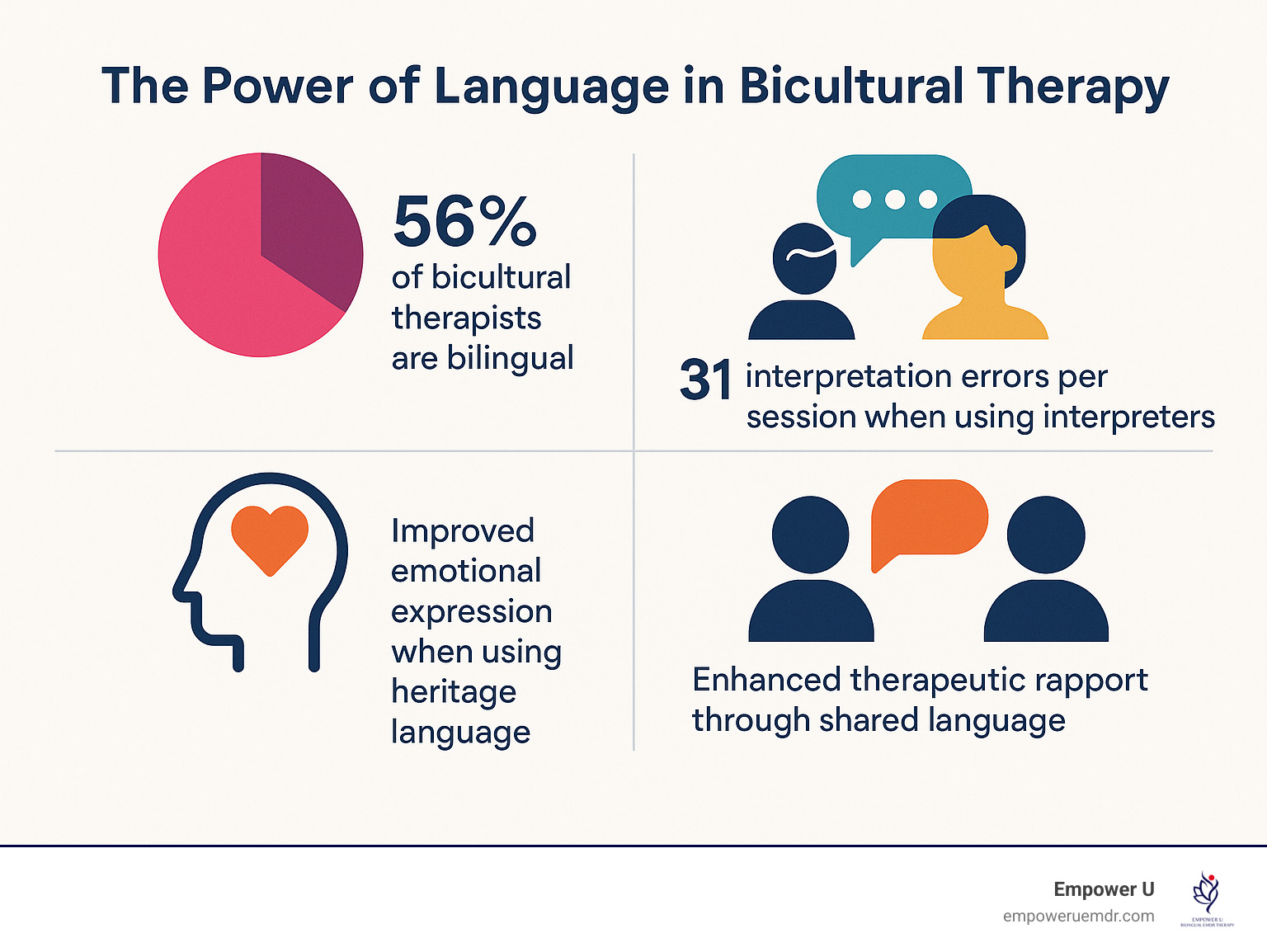Navigating Life Between Cultures: How Bicultural Therapy Helps You Find Your Place

Living between two cultures can feel like standing at the intersection of cultural worlds, never quite belonging fully to either one. If you're an adult child of immigrants or came to this country at a young age, you might recognize this feeling intimately. The constant navigation between your family's heritage values and mainstream American culture can create mental health challenges that traditional therapists don't always understand.
For bicultural individuals, cultural identity becomes a complex tapestry woven from multiple cultural experiences. This unique perspective brings both incredible strengths and specific mental health challenges that require specialized understanding and empathy from trained therapists who truly comprehend the bicultural experience.
As a bilingual therapist at Empower U who has walked this path myself, I specialize in bicultural therapy—an approach that doesn't ask you to choose between different cultures, but helps you integrate your bicultural identity and find strength in your multicultural background. My practice in Irvine serves clients online throughout California, offering a supportive space where every part of your cultural identity is welcome and understood.
When it comes to mental health and well being for bicultural individuals, traditional therapeutic approaches often fall short. They may lack the cultural sensitivity and deeper understanding needed to address the unique challenges that arise from navigating multiple cultural identities. This is where specialized bicultural therapy makes a profound difference in supporting your psychological well being and overall sense of identity.
Understanding Bicultural Therapy: More Than Traditional Counseling
Bicultural therapy goes far beyond simply acknowledging that cultural identity matters. It places your own cultural identity at the very center of the healing process, recognizing that your mental health cannot be separated from your cultural experiences and bicultural identity development. This therapeutic approach understands that the mental health challenges you face aren't just personal—they're deeply connected to navigating multiple cultural worlds and managing cultural expectations from different communities.
Many therapists may mention culture in passing, but bicultural therapy requires therapists with deep cultural competence and empathy for the bicultural experience. In traditional therapy, bicultural individuals might find themselves spending valuable session time explaining cultural context or feeling misunderstood when discussing family dynamics that don't fit typical American frameworks. This can create internal conflict and prevent deeper understanding of the root issues affecting your mental well being.
In bicultural therapy, I already understand concepts like familismo, respeto, and the weight of carrying your family's sacrifices and dreams. This shared understanding and cultural sensitivity allows us to dive deeper into healing from the very beginning, creating a more efficient path toward psychological well being and personal growth.
My approach integrates evidence-based therapeutic approaches specifically adapted for multicultural experiences and bicultural identity development:
EMDR Therapy targets memories linked to cultural shame, discrimination, or feeling "not enough" in either culture. I help reprocess experiences where you felt ashamed for expressing needs, emotions, or making mistakes transforming these painful memories into sources of strength and self acceptance.
Internal Family Systems (IFS) Therapy explores the different cultural parts of yourself—the dutiful daughter, the ambitious professional, the traditional self, the Americanized version. Rather than fighting these parts, I help them learn to collaborate and support each other, reducing internal conflict and promoting a greater sense of wholeness.
Cognitive Behavioral Therapy (CBT) and Dialectical Behavior Therapy (DBT) skills are adapted to address real-life dilemmas like balancing individual goals with cultural expectations, managing the stress of constant cultural code-switching, and developing healthy coping strategies that respect both your autonomy and family values.
Narrative Therapy helps you rewrite the story of your bicultural identity from one of confusion or deficit to one of cultural richness and unique perspective. This approach supports personal growth by helping you see your multicultural background as a valuable asset rather than a source of struggle.
Somatic Therapy techniques help process cultural trauma stored in the body, addressing the physical manifestations of navigating multiple cultural identities and the stress that comes from constant cultural adaptation.
The Unique Challenges of Living Between Two Cultures
Through my work with bicultural individuals and adult children of immigrants, I've seen how certain mental health challenges appear again and again in cultural communities navigating multiple cultural identities. You might feel "too American" when visiting extended family, yet "too foreign" among peers. Perhaps you experience guilt when pursuing goals that conflict with traditional cultural expectations, or exhaustion from constantly translating—not just language, but entire worldviews—for family members.
These unique challenges and cultural issues can manifest as significant mental health concerns:
- Anxiety from trying to please everyone, leading to a persistent sense of unease
- Depression stemming from identity confusion and isolation within both cultural worlds
- Self-doubt about your worth and belonging in either culture
- Guilt over disappointing family sacrifices or failing to meet cultural expectations
- Shame for expressing needs, emotions, or making mistakes—especially if you were taught these were signs of weakness or disrespect
Many clients come to me carrying what I call "cultural perfectionism"—the pressure to succeed in both cultures while making your family's sacrifices worthwhile. This burden, while understandable, can become overwhelming and significantly impact your mental well being and sense of self acceptance.
For bicultural individuals, these mental health challenges are often compounded by a lack of understanding from therapists who haven't experienced navigating multiple cultural identities themselves. The result is often inadequate support for the complex psychological well being needs that arise from living between different cultures.
Cultural Frame-Switching: Your Superpower, Not Your Problem
One of the most remarkable abilities that bicultural individuals develop is cultural frame-switching—the capacity to seamlessly move between different cultural contexts, adapting your behavior, language, and even aspects of your bicultural identity to fit each environment. This unique perspective allows you to navigate multiple cultural worlds with remarkable skill and empathy.
Whether you're switching from Spanish conversations at home to English presentations at work, or navigating different cultural expectations around family obligations versus individual achievement, this skill demonstrates incredible flexibility and emotional intelligence. Your ability to understand multiple cultural perspectives makes you a valuable asset in our increasingly diverse world.
However, this constant adaptation between two or more cultures can also be exhausting. You might feel fragmented, wondering which version of your cultural identity is the "real" one. Many bicultural individuals experience internal conflict about authenticity, questioning whether they're being true to themselves when they adapt to different cultural contexts.
In my practice, I help you understand that all versions of your bicultural identity are authentic—you're not confused or broken, you're beautifully complex. Cultural frame-switching isn't a problem to solve; it's a strength to embrace and manage mindfully. Through developing self compassion and a deeper understanding of your multicultural experience, you can transform this ability from a source of stress into a source of empowerment and personal growth.

My Approach: Understanding Born from Lived Experience
I didn't always plan to become a therapist. My journey to this field began in engineering, but as I navigated my own bicultural identity questions and challenges related to my cultural background, I realized I needed to pursue work that aligned more deeply with who I am. This career change was part of my own process of reconnecting with my own cultural identity and redefining my sense of self in a way that honored both my heritage and my American experience.
As a bicultural individual in a biracial, bicultural marriage raising three American children, I understand firsthand the complexity of navigating multiple cultural identities. Spanish is my first language, and I know what it's like to question where you belong and who you are when you exist between different cultures. This lived experience allows me to create a therapeutic environment where you don't have to explain or justify your cultural reality—I already understand it with deep empathy and cultural sensitivity.
My perspective as someone who has walked this path provides a level of understanding that goes beyond academic training. When bicultural individuals work with therapists who share similar experiences, they often report feeling more understood and making faster progress toward mental well being. This cultural concordance creates an immediate sense of connection and trust that accelerates the healing process.
My bilingual abilities mean you can switch between Spanish and English during sessions whenever it feels natural. Often, certain emotions or memories are more accessible in one language than another, and I encourage this natural flow as part of the healing process. This linguistic flexibility supports a deeper understanding of your bicultural experiences and allows for more authentic expression of your feelings and cultural background.
What to Expect: Your Journey Through Bicultural Therapy
The First Session: Beginning Your Story
In our first full session together, I invite you to begin sharing your story at your own pace. This isn't about checking boxes on a symptom list—it's about understanding the rich context of your life. I listen deeply and without judgment as you tell me what brings you to therapy, the patterns you've noticed, and the hopes you have for change.
I may gently ask questions to help you reflect on your family dynamics, cultural background, identity development, or life transitions. Together, we're not looking for what's "wrong" with you. Instead, we're seeking meaning, connections, and ways to reclaim your voice and power within your multicultural identity.
Understanding Your Story in Context
Once we begin working together, I approach your experiences through multiple lenses simultaneously. I want to understand not just what happened, but how your cultural background, family dynamics, generational influences, and current life stage all contribute to your present challenges.
I often use a timeline to map out key events you mention, which helps us both see patterns, turning points, and the impact certain experiences have had on your sense of self and relationships. This process helps us understand how cultural messages, family expectations, and societal pressures have shaped your internal narrative.
Building Clarity and Creating Your Plan
As your story unfolds, I provide psychoeducation about what might be happening emotionally, neurologically, or relationally. Understanding these processes helps you feel more empowered in your healing journey. I explain what I see as the core issues we're addressing and collaborate with you to create a plan for moving forward together.
This plan is never one-size-fits-all. It's carefully crafted to honor your cultural values, family relationships, and personal goals while addressing the specific challenges you're facing.
Developing Resources for Daily Life
Before diving into deeper trauma work, I focus on helping you build coping tools that make daily life more manageable. This foundation is crucial for feeling safe and stable as we explore more challenging territory together.
We might work on DBT skills for emotional regulation, strategies for reducing anxiety and overwhelm, or tools for grounding yourself when cultural stress becomes intense. I teach practical techniques for managing the fatigue that comes from constant code-switching and navigating different cultural expectations.
Exploring Your Internal System
As trust builds between us, we begin exploring the different parts of your identity through an Internal Family Systems approach. These might include protective inner voices or behaviors that developed to help you survive and succeed, but may now be causing pain or keeping you stuck.
For example, you might have a "perfect daughter" part that never wants to disappoint family, a "successful American" part that pushes for achievement, and a "authentic self" part that wants to honor your heritage. Through compassionate exploration, we help these parts learn to work together rather than fighting each other.
Healing at the Root with EMDR
Once you feel safe and resourced, we can begin exploring and reprocessing the root causes of your struggles through EMDR therapy. This might include early memories of feeling ashamed of your cultural background, experiences of discrimination, moments when you felt torn between cultural worlds, or intergenerational trauma from your family's migration story.
Intergenerational trauma often manifests in bicultural individuals as inherited patterns of fear, shame, or survival strategies that no longer serve your current life. These deep cultural wounds can affect your sense of identity, your relationships, and your overall mental well being in ways that require specialized therapeutic approaches to address effectively.
EMDR helps reduce the emotional charge of these experiences and shift the limiting beliefs that may be blocking your personal growth and self acceptance. This process is always done at your pace, with your safety and comfort as top priorities. The goal is to transform painful cultural experiences into sources of strength and resilience, supporting your journey toward greater psychological well being.
Rebuilding Self-Esteem from the Inside Out
Throughout our work together, I integrate practices that help you rebuild your relationship with yourself. This includes learning to live with greater purpose and awareness, building self-respect and self-trust, and developing the confidence to assert your needs and values in daily life.
These aren't abstract concepts—we apply them to real situations in your life each week, whether you're navigating workplace dynamics, family relationships, romantic partnerships, or parenting decisions.
The Power of Bilingual Therapy
Language carries emotion, memory, and cultural meaning in ways that go far beyond simple translation. When you speak Spanish, you might access different aspects of your emotional experience than when you speak English. In bilingual therapy, this natural language switching becomes a powerful tool for healing.
Research shows that bilingual processing accesses emotions differently, which is why direct bilingual therapy often reaches deeper than sessions conducted only in a second language. When you can express yourself in the language that holds your deepest feelings, breakthrough moments become more accessible.

Addressing Intergenerational Patterns and Cultural Trauma
Many of the mental health challenges you face aren't just personal—they're connected to intergenerational trauma and family patterns that have been passed down through generations. Your parents' experiences of immigration, discrimination, or survival might have shaped family dynamics in ways that now impact your mental health and sense of cultural identity.
Through specialized trauma therapy, we can explore how these inherited patterns show up in your life while honoring the strength and resilience that also flows through your family line. Understanding intergenerational trauma helps make sense of feelings and behaviors that might otherwise seem confusing or overwhelming. This deeper understanding supports your personal growth and helps break cycles that no longer serve your well being.
The goal isn't to blame previous generations, but to understand and heal patterns that no longer serve you while maintaining respect for your cultural heritage. Many therapists lack the cultural sensitivity and perspective needed to address these complex intergenerational dynamics effectively. This is why working with therapists who understand your cultural background and have empathy for the immigrant experience can make such a significant difference in your mental health journey.
When bicultural individuals work with culturally competent therapists who understand intergenerational trauma, they often experience faster progress and more meaningful healing. The therapeutic relationship becomes a space where your cultural complexity is not just tolerated but celebrated as a source of strength and unique perspective.
Beyond Individual Therapy: Supporting Families
While my primary focus is individual therapy, I also offer parent guidance for immigrant families navigating the challenges of raising bicultural children. These sessions help parents understand how to maintain connection to heritage while supporting their children's adaptation to American culture.
This work recognizes that healing often happens not just individually, but within family systems. When parents have support in navigating their own cultural challenges, the entire family benefits.
Online Therapy: Accessible, Culturally Sensitive Care
All my sessions are conducted online through secure, HIPAA-compliant video platforms. This format offers several advantages, particularly for bicultural individuals who may face barriers to accessing culturally sensitive care. Online therapy provides flexible scheduling, increased privacy, and the comfort of participating from your own supportive space.
Many bicultural individuals find that being in their own environment helps them feel more grounded and authentic during sessions. You can surround yourself with cultural objects that bring comfort, switch languages freely without concern about who might overhear, and access therapy from anywhere in California. This creates a more comfortable therapeutic environment that supports your mental well being and cultural identity expression.
The effectiveness of evidence-based therapeutic approaches like EMDR is fully maintained in online formats, and many clients find the convenience allows for more consistent attendance and engagement in their healing process. For bicultural individuals who may have limited access to therapists with cultural competence in their local area, online therapy opens up possibilities for working with specialists who truly understand your unique challenges and perspective.
This approach removes geographical barriers and provides access to therapists who have both the training and lived experience necessary to support your mental health journey with appropriate cultural sensitivity and empathy.
Common Questions About Bicultural Therapy
How is this different from regular therapy? While traditional therapists might mention culture as one factor among many, bicultural therapy centers your cultural experience as fundamental to understanding your mental health. Many therapists lack the cultural competence and empathy needed to truly understand the mental health challenges faced by bicultural individuals. I don't just acknowledge your cultural background—I understand it from the inside because I live it too, providing the deeper understanding and cultural sensitivity that supports more effective healing.
How long does therapy typically take? Many clients notice relief within the first few months as we build coping strategies and create a culturally supportive space for healing. This early progress in mental well being often comes from finally feeling understood and having their bicultural identity validated. Deeper work on intergenerational trauma and cultural identity integration often unfolds over 12 months to 24, but the timeline is always personalized to your unique needs, goals, and cultural background.
Can I really switch languages during sessions? ¡Absolutamente! You're welcome to move between Spanish and English as naturally as feelings arise. This code-switching often helps access memories and emotions that might remain hidden when restricted to one language. For bicultural individuals, this linguistic flexibility supports more authentic expression and contributes to better therapeutic outcomes and mental well being.
Will therapy help me stop feeling torn between cultures? The goal isn't to stop feeling the complexity of your multicultural identity—it's to transform that complexity from a source of internal conflict into a source of strength and self acceptance. We work on integration rather than choosing, helping you develop compassionate boundaries and authentic ways of honoring all parts of your cultural identity. This process supports your mental health by reducing the stress and anxiety that comes from feeling like you don't fully belong anywhere.
Do you work with people from all cultural backgrounds? While my personal experience is as a Latina immigrant, my training and therapeutic approaches can benefit anyone navigating multiple cultural identities. However, I'm particularly effective with clients whose experiences resonate with mine—adult children coming from collectivistic cultures such as Latin, Middle Eastern, North African, Asian and Russian, and others who share similar cultural values, challenges, and perspectives. The cultural concordance between therapist and client often leads to better outcomes and improved mental well being for bicultural individuals.

Finding Strength in Your Multicultural Identity and Unique Perspective
Living between different cultures isn't a burden to bear—it's a unique perspective that offers incredible gifts and valuable assets for navigating our diverse world. Your ability to see multiple viewpoints, navigate different cultural contexts, and bridge cultural gaps makes you valuable in ways that those from monocultural backgrounds might never fully understand.
For bicultural individuals, developing a greater sense of self acceptance and fully belonging to multiple cultural worlds represents the ultimate goal of mental health work. Your bicultural identity isn't something that needs fixing—it's something that needs celebrating, integrating, and honoring. When you can embrace all parts of your cultural identity, you discover a sense of wholeness and authenticity that transforms not just your relationship with yourself, but your relationships with family, cultural communities, and the broader world.
In bicultural therapy, my goal is to help you recognize these strengths while healing the wounds that cultural navigation may have created. Together, we transform feelings of "not belonging anywhere" into "fully belonging to multiple places" and shift "being torn between cultural worlds" into "building bridges between cultures." This transformation supports not only your mental well being but also your ability to live a more fulfilling life.
The therapeutic process becomes a journey of personal growth where your complexity is not just accepted—it's celebrated. Through developing coping strategies, addressing mental health challenges, and building a stronger sense of your own cultural identity, you can transform the challenge of navigating multiple cultural identities into the gift of belonging fully to yourself.
Taking the Next Step Toward Mental Well Being
If you recognize yourself in these words—if you're tired of feeling caught between cultural worlds, exhausted from constant code-switching, or struggling with guilt about not meeting everyone's cultural expectations—I invite you to reach out. As someone who has walked this path and found my way to integration and peace, I'm here to support you on your own journey toward mental well being and cultural identity integration.
Healing doesn't mean choosing between your heritage and your current life. It means finding ways to honor both while creating space for your authentic bicultural identity to thrive. In a world that often asks bicultural individuals to simplify themselves, therapy becomes a supportive space where your complexity is not just accepted—it's celebrated.
Working with therapists who understand your unique perspective and can provide culturally sensitive care makes a significant difference in addressing mental health challenges effectively. When you have access to therapeutic approaches specifically designed for bicultural individuals, you can experience deeper understanding, faster progress, and more meaningful personal growth.
Your story matters. Your cultural identity is a source of strength. Your bicultural experiences bring valuable assets and unique challenges that deserve specialized attention and empathy from qualified therapists. And your journey toward integration, self acceptance, and mental well being is not one you have to walk alone.
At Know Your Mind, together, we can transform the challenge of navigating multiple cultural identities into the gift of fully belonging to yourself while honoring all aspects of your cultural background. Through this process, you'll develop better coping strategies, experience improved mental health, and discover the fulfilling life that comes from embracing your complete, multicultural identity.
Ready to begin your journey toward greater mental well being and cultural identity integration? Reach out today to schedule a consultation and learn more about how bicultural therapy can support your unique path toward healing and wholeness.

